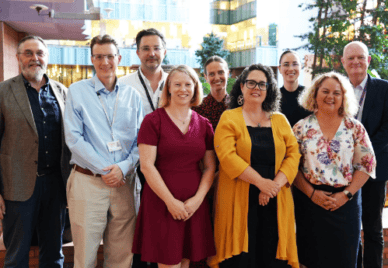
NCRIS Facilities Showcase Cutting-Edge Services for Health Researchers and Industry
Exploreabout NCRIS Facilities Showcase Cutting-Edge Services for Health Researchers and Industry
The ongoing novel coronavirus (2019-nCoV) outbreak has demonstrated the importance of sharing data in a timely manner to implement infection control and prevention measures. China has made the genetic sequence data of 2019-nCoV available on virological.org which can also be accessed on National Center for Biotechnology Information (NCBI) databases (GenBank accession number MN908947). The data is being accessed by researchers all over the world to better understand the source and characteristics of the virus.
Past public health and infectious disease emergencies have demonstrated the challenges associated with rapid gathering, integration and sharing of research data to generate knowledge for public health responses.
The Australian Partnership for Preparedness Research on Infectious Disease Emergencies (APPRISE) is a Centre for Research Excellence (CRE) funded by the National Health and Medical Research Council. APPRISE is developing research to inform and enable Australia’s preparedness and response to infectious disease emergencies in a timely manner.
Prof Jodie McVernon, a member of the executive leadership group of APPRISE and Director of Epidemiology at the Peter Doherty Institute for Infection and Immunity, says a major focus for APPRISE is facilitating rapid collection of data to generate information and knowledge crucial for a timely research response.
“Sharing research data rapidly with government departments and agencies can support their decision-making to create better health outcomes for Australians during infectious disease emergencies,” Prof McVernon said.
APPRISE health informatician Priyanka Pillai supports the geographically distributed network of researchers and data holders and provides strategic advice to facilitate national and international information sharing.
“It is not a simple task to gather research data and information from varied sources during an infectious disease emergency. Making research data consistent and shareable will improve the accessibility of information and enable exchange and use of information across diverse computer systems.” Priyanka says.
The ecosystem of infectious diseases data pulls together information from a range of sources like emergency departments, general practices, observational studies in hospitals, genomics data, surveillance systems, diagnostic laboratories and epidemiological studies. It is essential to improve data collection, facilitate data sharing and support data usage for decision-making in the infectious diseases research community.
There is global support for making public health data, where appropriate, available under FAIR (Findable, Accessible, Interoperable and Reusable) Principles to support knowledge integration, innovation and discovery.
Priyanka will be running a session entitled “The value of making data F.A.I.R to respond to infectious disease emergencies” during the Research Data Alliance (RDA) 15th Plenary Meeting in Melbourne this year. Be quick, register now and catch the early bird registration.